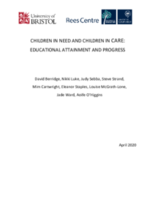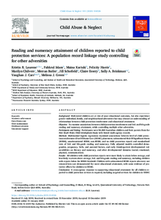Displaying 31 - 40 of 350
This project aimed to identify factors that might explain the ‘attainment gap’ for Children in Need (CIN) and Children in Care (CIC) in England.
This paper offers some insight into the benefits, impacts and challenges of the ‘creative mentor’ role. It links to a social pedagogy framework, supporting practice, and draws on creative mentors’ work with children and young people living in care. It aims to inform professionals and teams around a child about the transforming nature of working with creativity – beyond the obvious external experiences.
The authors of this study used a retrospective cohort design with linked administrative data on 296,422 children to examine the relationship between school absenteeism and child protection system (CPS) involvement.
In this article journalist Mykeala Campanini explores why a majority of children in out-of-home care (OOHC) in Australia are struggling to reach national literacy and numeracy benchmarks, which puts them at risk of becoming disengaged with schooling, resulting in lifelong disadvantage.
This study draws on data from the [STUDY] and the National Student Clearinghouse to examine the roles that Education and Training Vouchers (ETVs) and campus support programs (CSPs) play in promoting college persistence for foster youth.
This systematic review of qualitative research aimed to identify and synthesise the findings of relevant studies that documented the experiences of children in care in regard to their school experiences.
This case explores the complex ways unaccompanied Latinx Indigenous minors experience the intersection of immigration policies and U.S. school policies and practices and the implications this has for school leaders.
This systematic review of qualitative research aimed to identify and synthesise the findings of relevant studies that documented the experiences of children in care in regard to their school experiences.
The purpose of this study was to examine associations between child protection involvement and 3rd- and 5th-grade reading and numeracy attainment, while controlling multiple other adversities.
This study examined the impact of health care education materials designed for foster youth, called ICare2CHECK. It was hypothesized that ICare2CHECK would increase nonurgent ambulatory health care use and decrease emergency/urgent care use.


